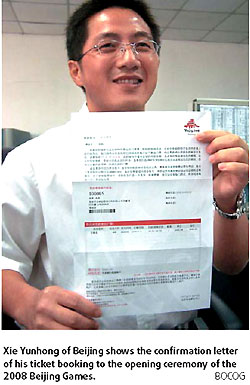If you have received notification that you have missed out on all the Olympic tickets you applied for, or if you have secured only one or two of your second-choice seats, don't fret.

Some consolation can be drawn from the knowledge that among 720,000 people who applied for a total of 5.18 million tickets at next year's Games, less than half, or about 300,000, were at all successful. They were allocated close to 1.6 million tickets in the first round of booking.
The chances of getting a ticket to the opening ceremony, which costs 5,000 yuan ($661) were one in 21. For the closing ceremony, they are only slightly better: one in seven. BOCOG has promised to send or email every applicant a "notification" letter, even if their bids were unsuccessful.
According to ticketing officials, one of the youngest winners of the ballot for the opening ceremony was a three-year-old kindergartner in Beijing who did not even have the required bank account until her mother placed an order for her.
Unless you expect to be struck by good fortune in this Olympic ticketing frenzy, you might want to manage your expectations when you book again. It is also useful to spend a few minutes making an educated guess regarding your future chances.
In my case, I am still wondering why there were as many as 600,000 tickets left after the first phase of the ticket sales, when a total of 2.2 million were available from April to June.
Was it largely because applicants had over-concentrated on traditionally popular sports, such as basketball, diving, table tennis, soccer and gymnastics? If so, which tickets were not sold?
Some unofficial surveys prior to the ticketing campaign found a number of sports were less popular with Beijing residents, including the modern pentathlon, canoe and kayak races, softball and water polo.
As an indication of spectators' preferences, the tickets for the finals of the premium sports competitions are priced from 800 to 1,000 yuan each. However, those for gold-medal competitions in the modern pentathlon cost merely 30-40 yuan, or 80-100 yuan for canoe and kayak.
The less popular events are also called "experience" sports because they offer people an opportunity to attend the Olympic Games.
Or did other factors, such as the timing and location of the competitions, also contribute to the slow rate of sales? Some of the sports will obviously take place during the daytime on weekdays, while others will be held in distant suburban areas or in co-host cities like Hong Kong.